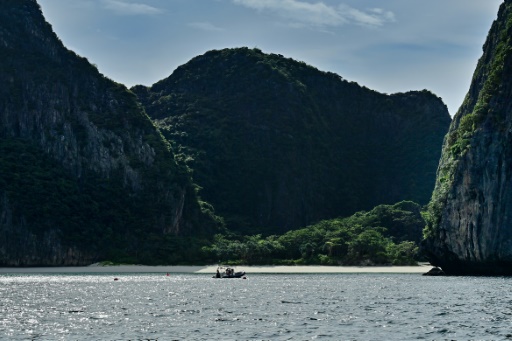Thai court orders rehab work on 'The Beach' 22 years after filming

More than two decades after Hollywood film "The Beach" was shot at Thailand's glittering Maya Bay, the kingdom's Supreme Court on Tuesday ordered officials to press ahead with environmental rehabilitation work.
The 2000 adventure drama, starring Leonardo DiCaprio, drew criticism for the impact of the shoot on the pristine sands of the bay, located on the island of Ko Phi Phi Ley in southern Thailand. Film-makers planted dozens of coconut trees to give a more "tropical" feel to the glimmering Maya Bay and were also accused of ripping up vegetation growing on sand dunes.Read More : Tourists help to release 34 baby sharks on Thailand's biggest island However, U.S. production studio 20th Century Fox insisted it left the beach exactly how it had found it and had removed tonnes of rubbish.
Local authorities filed a civil lawsuit in late 1999 against Thai government agencies, U.S. filmmaker 20th Century Fox and a Thai film coordinator, seeking 100 million baht in compensation for environmental damage.
On Tuesday, the Supreme Court in Bangkok upheld a previous ruling by a Civil Court that the Royal Forest Department was liable for rehabilitating Maya Bay.
In a final ruling, the Supreme Court ordered the department to set up a committee to formulate a rehabilitation plan within 30 days. Environmental campaigners launched two unsuccessful legal challenges to stop filming of the movie based on Alex Garland's cult novel, over concerns about ecological damage.
The film put Maya Bay on the map and it became a victim of mass tourism. It was closed in October 2018 to allow it to recover from the impact of a daily influx of some 6,000 visitors.
The entire Phi Phi archipelago was forced into a convalescence when the global pandemic hit and visitor numbers dwindled to virtually nil as Thailand imposed tough travel rules. Maya Bay reopened to tourists at the start of 2022 but visitor numbers are capped to try to limit the ecological damage.
The 2000 adventure drama, starring Leonardo DiCaprio, drew criticism for the impact of the shoot on the pristine sands of the bay, located on the island of Ko Phi Phi Ley in southern Thailand. Film-makers planted dozens of coconut trees to give a more "tropical" feel to the glimmering Maya Bay and were also accused of ripping up vegetation growing on sand dunes.
Local authorities filed a civil lawsuit in late 1999 against Thai government agencies, U.S. filmmaker 20th Century Fox and a Thai film coordinator, seeking 100 million baht in compensation for environmental damage.
On Tuesday, the Supreme Court in Bangkok upheld a previous ruling by a Civil Court that the Royal Forest Department was liable for rehabilitating Maya Bay.
In a final ruling, the Supreme Court ordered the department to set up a committee to formulate a rehabilitation plan within 30 days. Environmental campaigners launched two unsuccessful legal challenges to stop filming of the movie based on Alex Garland's cult novel, over concerns about ecological damage.
The film put Maya Bay on the map and it became a victim of mass tourism. It was closed in October 2018 to allow it to recover from the impact of a daily influx of some 6,000 visitors.
The entire Phi Phi archipelago was forced into a convalescence when the global pandemic hit and visitor numbers dwindled to virtually nil as Thailand imposed tough travel rules. Maya Bay reopened to tourists at the start of 2022 but visitor numbers are capped to try to limit the ecological damage.
Source: japantoday.com
